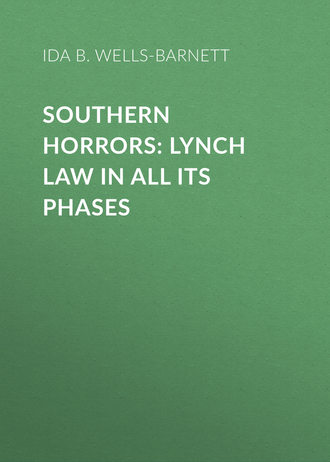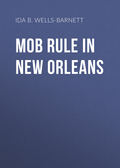
Ida B. Wells-Barnett
Southern Horrors: Lynch Law in All Its Phases
Ebenzer Fowler, the wealthiest colored man in Issaquena County, Miss., was shot down on the street in Mayersville, January 30, 1885, just before dark by an armed body of white men who filled his body with bullets. They charged him with writing a note to a white woman of the place, which they intercepted and which proved there was an intimacy existing between them.
Hundreds of such cases might be cited, but enough have been given to prove the assertion that there are white women in the South who love the Afro-American's company even as there are white men notorious for their preference for Afro-American women.
There is hardly a town in the South which has not an instance of the kind which is well known, and hence the assertion is reiterated that "nobody in the South believes the old thread bare lie that negro men rape white women." Hence there is a growing demand among Afro-Americans that the guilt or innocence of parties accused of rape be fully established. They know the men of the section of the country who refuse this are not so desirous of punishing rapists as they pretend. The utterances of the leading white men show that with them it is not the crime but the class. Bishop Fitzgerald has become apologist for lynchers of the rapists of white women only. Governor Tillman, of South Carolina, in the month of June, standing under the tree in Barnwell, S.C., on which eight Afro-Americans were hung last year, declared that he would lead a mob to lynch a negro who raped a white woman. So say the pulpits, officials and newspapers of the South. But when the victim is a colored woman it is different.
Last winter in Baltimore, Md., three white ruffians assaulted a Miss Camphor, a young Afro-American girl, while out walking with a young man of her own race. They held her escort and outraged the girl. It was a deed dastardly enough to arouse Southern blood, which gives its horror of rape as excuse for lawlessness, but she was an Afro-American. The case went to the courts, an Afro-American lawyer defended the men and they were acquitted.
In Nashville, Tenn., there is a white man, Pat Hanifan, who outraged a little Afro-American girl, and, from the physical injuries received, she has been ruined for life. He was jailed for six months, discharged, and is now a detective in that city. In the same city, last May, a white man outraged an Afro-American girl in a drug store. He was arrested, and released on bail at the trial. It was rumored that five hundred Afro-Americans had organized to lynch him. Two hundred and fifty white citizens armed themselves with Winchesters and guarded him. A cannon was placed in front of his home, and the Buchanan Rifles (State Militia) ordered to the scene for his protection. The Afro-American mob did not materialize. Only two weeks before Eph. Grizzard, who had only been charged with rape upon a white woman, had been taken from the jail, with Governor Buchanan and the police and militia standing by, dragged through the streets in broad daylight, knives plunged into him at every step, and with every fiendish cruelty a frenzied mob could devise, he was at last swung out on the bridge with hands cut to pieces as he tried to climb up the stanchions. A naked, bloody example of the blood-thirstiness of the nineteenth-century civilization of the Athens of the South! No cannon or military was called out in his defense. He dared to visit a white woman.
At the very moment these civilized whites were announcing their determination "to protect their wives and daughters," by murdering Grizzard, a white man was in the same jail for raping eight-year-old Maggie Reese, an Afro-American girl. He was not harmed. The "honor" of grown women who were glad enough to be supported by the Grizzard boys and Ed Coy, as long as the liaison was not known, needed protection; they were white. The outrage upon helpless childhood needed no avenging in this case; she was black.
A white man in Guthrie, Oklahoma Territory, two months ago inflicted such injuries upon another Afro-American child that she died. He was not punished, but an attempt was made in the same town in the month of June to lynch an Afro-American who visited a white woman.
In Memphis, Tenn., in the month of June, Ellerton L. Dorr, who is the husband of Russell Hancock's widow, was arrested for attempted rape on Mattie Cole, a neighbors cook; he was only prevented from accomplishing his purpose, by the appearance of Mattie's employer. Dorr's friends say he was drunk and not responsible for his actions. The grand jury refused to indict him and he was discharged.
THE NEW CRY
The appeal of Southern whites to Northern sympathy and sanction, the adroit, insiduous plea made by Bishop Fitzgerald for suspension of judgment because those "who condemn lynching express no sympathy for the white woman in the case," falls to the ground in the light of the foregoing.
From this exposition of the race issue in lynch law, the whole matter is explained by the well-known opposition growing out of slavery to the progress of the race. This is crystalized in the oft-repeated slogan: "This is a white man's country and the white man must rule." The South resented giving the Afro-American his freedom, the ballot box and the Civil Rights Law. The raids of the Ku-Klux and White Liners to subvert reconstruction government, the Hamburg and Ellerton, S.C., the Copiah County, Miss., and the Layfayette Parish, La., massacres were excused as the natural resentment of intelligence against government by ignorance.
Honest white men practically conceded the necessity of intelligence murdering ignorance to correct the mistake of the general government, and the race was left to the tender mercies of the solid South. Thoughtful Afro-Americans with the strong arm of the government withdrawn and with the hope to stop such wholesale massacres urged the race to sacrifice its political rights for sake of peace. They honestly believed the race should fit itself for government, and when that should be done, the objection to race participation in politics would be removed.
But the sacrifice did not remove the trouble, nor move the South to justice. One by one the Southern States have legally(?) disfranchised the Afro-American, and since the repeal of the Civil Rights Bill nearly every Southern State has passed separate car laws with a penalty against their infringement. The race regardless of advancement is penned into filthy, stifling partitions cut off from smoking cars. All this while, although the political cause has been removed, the butcheries of black men at Barnwell, S.C., Carrolton, Miss., Waycross, Ga., and Memphis, Tenn., have gone on; also the flaying alive of a man in Kentucky, the burning of one in Arkansas, the hanging of a fifteen-year-old girl in Louisiana, a woman in Jackson, Tenn., and one in Hollendale, Miss., until the dark and bloody record of the South shows 728 Afro-Americans lynched during the past eight years. Not fifty of these were for political causes; the rest were for all manner of accusations from that of rape of white women, to the case of the boy Will Lewis who was hanged at Tullahoma, Tenn., last year for being drunk and "sassy" to white folks.
These statistics compiled by the Chicago Tribune were given the first of this year (1892). Since then, not less than one hundred and fifty have been known to have met violent death at the hands of cruel bloodthirsty mobs during the past nine months.
To palliate this record (which grows worse as the Afro-American becomes intelligent) and excuse some of the most heinous crimes that ever stained the history of a country, the South is shielding itself behind the plausible screen of defending the honor of its women. This, too, in the face of the fact that only one-third of the 728 victims to mobs have been charged with rape, to say nothing of those of that one-third who were innocent of the charge. A white correspondent of the Baltimore Sun declares that the Afro-American who was lynched in Chestertown, Md., in May for assault on a white girl was innocent; that the deed was done by a white man who had since disappeared. The girl herself maintained that her assailant was a white man. When that poor Afro-American was murdered, the whites excused their refusal of a trial on the ground that they wished to spare the white girl the mortification of having to testify in court.
This cry has had its effect. It has closed the heart, stifled the conscience, warped the judgment and hushed the voice of press and pulpit on the subject of lynch law throughout this "land of liberty." Men who stand high in the esteem of the public for Christian character, for moral and physical courage, for devotion to the principles of equal and exact justice to all, and for great sagacity, stand as cowards who fear to open their mouths before this great outrage. They do not see that by their tacit encouragement, their silent acquiescence, the black shadow of lawlessness in the form of lynch law is spreading its wings over the whole country.
Men who, like Governor Tillman, start the ball of lynch law rolling for a certain crime, are powerless to stop it when drunken or criminal white toughs feel like hanging an Afro-American on any pretext.
Even to the better class of Afro-Americans the crime of rape is so revolting they have too often taken the white man's word and given lynch law neither the investigation nor condemnation it deserved.
They forget that a concession of the right to lynch a man for a certain crime, not only concedes the right to lynch any person for any crime, but (so frequently is the cry of rape now raised) it is in a fair way to stamp us a race of rapists and desperadoes. They have gone on hoping and believing that general education and financial strength would solve the difficulty, and are devoting their energies to the accumulation of both.
The mob spirit has grown with the increasing intelligence of the Afro-American. It has left the out-of-the-way places where ignorance prevails, has thrown off the mask and with this new cry stalks in broad daylight in large cities, the centers of civilization, and is encouraged by the "leading citizens" and the press.




